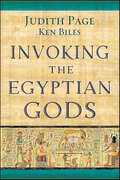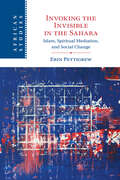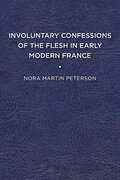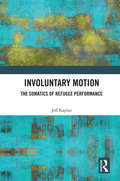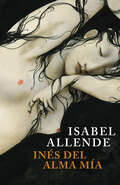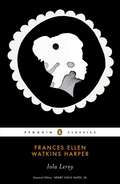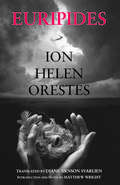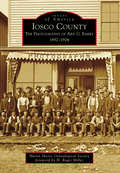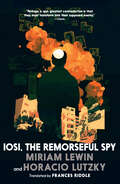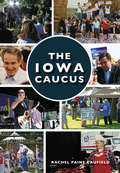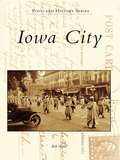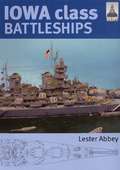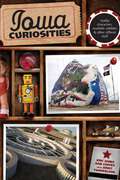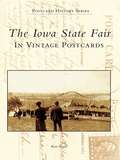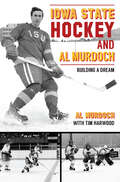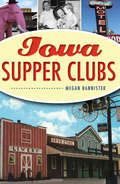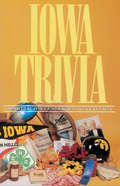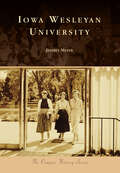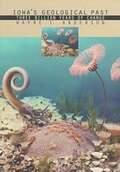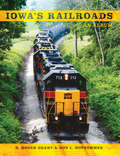- Table View
- List View
Invoking the Egyptian Gods
by Judith Page Ken BilesDelve into the powerful undercurrents of Egyptian magick and be forever changed. This book presents authentic rituals to invoke the gods. Step into their hidden realm, where true gnosis and healing are found.A deeply spiritual experience unfolds as you begin to invoke the deities of ancient Egypt. Discover your true magickal name, create a doorway into other dimensions, receive messages from the Neteru, and become one with the gods once again.Call upon Isis for boundless loveInvoke the warrior goddess Sekhmet for protectionSummon Nut to unleash your creativityReconnect with Hathor, Osiris, and many other gods and goddessesCombining elegant rites with an evocative description of each deity's myths, this book invites you to begin a soul-level transformation and awaken to your own strength, power, and divinity.
Invoking the Invisible in the Sahara: Islam, Spiritual Mediation, and Social Change (African Studies #159)
by Erin PettigrewIn this innovative new history, Erin Pettigrew utilizes invisible forces and entities - esoteric knowledge and spirits - to show how these forms of knowledge and unseen forces have shaped social structures, religious norms, and political power in the Saharan West. Situating this ethnographic history in what became la Mauritanie under French colonial rule and, later the Islamic Republic of Mauritania, Pettigrew traces the changing roles of Muslim spiritual mediators and their Islamic esoteric sciences - known locally as l'ḥjāb - over the long-term history of the region. By exploring the impact of the immaterial in the material world and demonstrating the importance of Islamic esoteric sciences in Saharan societies, she illuminates peoples' enduring reliance upon these sciences in their daily lives and argues for a new approach to historical research that takes the immaterial seriously.
Involuntary Confessions of the Flesh in Early Modern France (The Early Modern Exchange)
by Nora Martin PetersonInvoluntary Confessions of the Flesh in Early Modern France was inspired by the observation that small slips of the flesh (involuntary confessions of the flesh) are omnipresent in early modern texts of many kinds. These slips (which bear similarities to what we would today call the Freudian slip) disrupt and destabilize readings of body, self, and text—three categories whose mutual boundaries this book seeks to soften—but also, in their very messiness, participate in defining them. Involuntary Confessions capitalizes on the uncertainty of such volatile moments, arguing that it is instability itself that provides the tools to navigate and understand the complexity of the early modern world. Rather than locate the body within any one discourse (Foucauldian, psychoanalytic), this book argues that slips of the flesh create a liminal space not exactly outside of discourse, but not necessarily subject to it, either. Involuntary confessions of the flesh reveal the perpetual and urgent challenge of early modern thinkers to textually confront and define the often tenuous relationship between the body and the self. By eluding and frustrating attempts to contain it, the early modern body reveals that truth is as much about surfaces as it is about interior depth, and that the self is fruitfully perpetuated by the conflict that proceeds from seemingly irreconcilable narratives. Interdisciplinary in its scope, Involuntary Confessions of the Flesh in Early Modern France pairs major French literary works of the sixteenth and seventeenth centuries (by Marguerite de Navarre, Montaigne, Madame de Lafayette) with cultural documents (confession manuals, legal documents about the application of torture, and courtly handbooks). It is the first study of its kind to bring these discourses into thematic (rather than linear or chronological) dialog. In so doing, it emphasizes the shared struggle of many different early modern conversations to come to terms with the body’s volatility. Published by University of Delaware Press. Distributed worldwide by Rutgers University Press.
Involuntary Consent: The Illusion of Choice in Japan’s Adult Video Industry
by Akiko TakeyamaThe popularity of pornography is predicated on the idea that those participating have given their consent. That is what allows the porn industry to dominate the media economy today, generating staggering sums of money. Looking at behind-the-scenes negotiations and abuses in Japan's adult video industry, author Akiko Takeyama challenges this pervasive notion with the idea of "involuntary consent." This phenomenon, she argues, is ubiquitous, not only in the porn industry, but in our everyday lives. And yet modern society, built on beliefs of autonomy, free choice, and equality, renders it all but invisible. Japan's AV industry alone generates a conservatively estimated $5 billion a year. In recent years, it has drawn public attention, and criticism, because of a series of arrests and trials of former talent agency owners and executives. This led to a report calling for a systematic investigation of the industry over the issue of "forced performance." This report has had ripple effects beyond Japan, as the US Department of State subsequently also cited forced performance as a human rights violation. Using this moment as an entry point, Takeyama argues that contract-making writ large is based on fundamentally dualistic terms, implying consent and pleasure on the one hand, and coercion and pain on the other. Because sex workers are employed on a contract basis, they fall outside of the purview of standard labor and employment laws. As a result, they are frequently pressured to comply with what production companies (mostly run by men) expect and often demand. In this ethnography of Japan's porn industry, Akiko Takeyama investigates the paradox of involuntary consent in modern liberal democratic societies. Taking consent as her starting point, Takeyama illustrates the nuances of contract making and the legal structures, or lack thereof, that govern Japan's adult video and sex entertainment industries.
Involuntary Motion: The Somatics of Refugee Performance
by Jeff KaplanInvoluntary Motion contributes to the study of refugee flight by using movement as a lens to explore problems in refugee performance and understand the experience of bodies in motion. Drawing from Somatics, Movement Analysis, and dance praxis, the chapters explore forces that set bodies in motion; the spaces in which forced movement occurs; the movement of refugee identity arcs; the monstrosity of refugee performance; and the relationship between writing and body culture. How does forced movement impact identity? What are the philosophical implications of robbing agency over motion? What performances does involuntary motion necessitate? These questions are important as the world confronts the threat of a return of the horrors of the Twentieth Century. Bringing together debates in Migration Studies and Movement Studies, the book argues that refugees are akin to dancers performing on disappearing stages, not of their choosing. It will be of great interest to students and scholars of performance, dance and politics.
Inés del alma mía
by Isabel AllendeEsta novela está basada en la vida de Inés Suárez, una mujer extremeña cuyo esposo, Juan de Málaga, viaja al Nuevo Mundo en el s. XVI en busca de El Dorado. Años después ella decide ir en su búsqueda. Cuando recibe la noticia de que su esposo ha fallecido, se une al grupo de conquistadores que pretenden llegar a Chile. La fuerza de Inés le ayuda a sobrevivir ante todo tipo de percances: el viaje en barco, su llegada a Perú y cómo sale airosa de todas las situaciones gracias a sus habilidades femeninas mezcladas con un espíritu masculino. La parte más épica es la que se centra en el instinto de superviviencia cuando se lleva a cabo la travesía hasta Chile y cómo tienen que reaccionar frente al ataque de los indios mapuche, y la parte más amable es una espectacular historia de amorque tiene como protagonista a Pedro de Valdivia: un hombre ambicioso al que Inés consigue dominar y compartir con él la aventura de la conquista de Chile. La intuición femenina les ayuda a superar muchos percances y el amor entre ambos es tan potente que es inimaginable pensar en una separación. Las aspiraciones políticas de Pedro potenciarán la ruptura entre ambos pero la huella que dejará el conquistador en esta mujer fuerte y valiente perdurará hasta el resto de sus días. Los indios nunca llegan a aceptar que los conquistadores españoles se afinquen en sus tierras. Atacan y saquean Santiago y hay que comenzar de nuevo. Inés no se da por vencida y junto a Rodrigo de Quiroga, que ha sido hombre de confianza de Pedro de Valdivia reconstruyen la ciudad. Nace entre ellos una relación distinta , un amor adulto, que no se puede comparar a la relación de complicidad que había existido entre Inés y Pedro, pero que se traduce en estabilidad y confianza. Inés nunca ha tenido hijos y la hija de Rodrigo será su confidente cuando llega a la vejez.
Inés del alma mía
by Isabel AllendeUna bella historia de amor, lucha, traición y pasión. El libro en que se basa la serie. Inés Suárez es una joven y humilde costurera extremeña que se embarca hacia el Nuevo Mundo para buscar a su marido, extraviado con sus sueños de gloria al otro lado del Atlántico. Anhela también una vida de aventuras, vetada a las mujeres en la pacata sociedad del siglo XVI. En América, Inés no encuentra a su marido, pero sí un amor apasionado: Pedro de Valdivia, maestre de campo de Francisco Pizarro, junto a quien Inés se enfrenta a los riesgos y las incertidumbres de la conquista y la fundación del reino de Chile. En esta novela épica el aliento del amor concede una tregua a la rudeza, la violencia y la crueldad de un momento histórico inolvidable. A través de la pluma de Isabel Allende se confirma que la realidad puede ser tan sorprendente o más que la mejor ficción, e igualmente cautivadora. Reseñas:«Basándose en las vivencias documentadas de su heroína, Allende compone una novela épica, ágil y emocionante, llena de cruentas batallas y romances apasionados.»Publishers Weekly «Allende consigue resucitar a una mujer del olvido histórico y dotarla de las cualidades de una heroína.»New York Times Book Review. «Allende[...] ha escritu su obra más contundentente desde La casa de los espíritus.»USA Today «La imaginación de Allende consigue cautivarnos [...] Esta es una obra que sus seguidores no deberían perderse.»Miami Herald
Iola Leroy
by Frances Ellen Watkins HarperFirst published in 1892, this stirring novel by the great writer and activist Frances Harper tells the story of the young daughter of a wealthy Mississippi planter who travels to the North to attend school, only to be sold into slavery in the South when it is discovered that she has Negro blood. After she is freed by the Union army, she works to reunify her family and embrace her heritage, committing herself to improving the conditions for blacks in America. Through her fascinating characters, including Iola's brother who fights at the front in a colored regiment, Harper weaves a vibrant and provocative chronicle of the Civil War and its consequences through African American eyes in this critical contribution to the nation's literature.
Ion, Helen, Orestes
by Euripides Matthew Wright Diane Arnson SvarlienAn acclaimed translator of Euripidean tragedy in its earlier and more familiar modes, Diane Arnson Svarlien now turns to three plays that showcase the special qualities of Euripides’ late dramatic art. Like her earlier volumes, Ion, Helen, Orestes offers modern, accurate, accessible, and stageworthy versions that preserve the metrical and musical form of the originals. Matthew Wright’s Introduction and notes offer illuminating guidance to first-time readers of Euripides, while pointing up the appeal of this distinctive grouping of plays.
Iosco County: The Photography of Ard G. Emery 1892-1904
by H. Roger Miller Huron Shores Genealogical SocietyIn 1892, artistic photographer Ard G. Emery established a studio and gallery business in a bustling East Tawas community overlooking Lake Huron on the sunrise side of Iosco County, Michigan. For 12 years, Emery captured the culture and history of the area through his camera lens. His collodion glass negatives celebrated personal triumphs, honored the strength of the working man, and saluted the candidness of the young. Emery used the most modern techniques and finest materials, but he was fascinated by the ordinary. Emery often journeyed with his travelling studio to the countryside to photograph the everyday life of normal people. Zealous about his craft, Emery not only preserved days gone by, but he also preserved his own spirit--one that will be forever remembered in Iosco County.
Iosi, the Remorseful Spy
by Horacio Lutzky Miriam LewinA gripping true crime tale of espionage, Jewish history, and antisemitic mass terrorism in 1990s Buenos Aires. An unresolved true story that echoes today, this book shows that even after the military regime ended in Argentina and there was a civilian government, military and national police remained racist and antisemitic.José Pérez, a young intelligence agent of the Federal Police, receives orders from his bosses to infiltrate the Argentine Jewish community by posing as a Jew. The goal is to monitor the development of an alleged Jewish plan to take over Patagonia to create a second state of Israel, known as the &“Andinia Plan.&”Iosi, the Hebrew name he chooses, blends in by learning the language, culture, history, religion, and politics of the Jewish people: he becomes a well-respected community leader and obtains valuable information that he passes on to his handler, the enigmatic and seductive Laura, or Red as she is called. Iosi soon understands that there is nothing suspicious going on within the Argentine Jewish community. Prone to amorous adventures, he lets himself go and falls madly in love with a young Hebrew teacher, marries her in secret and plans to convert and emigrate with her to Israel.When the two most catastrophic terrorist attacks in Argentinian history take place, one against the Israeli embassy in 1992 and the other against Asociación Mutual Israelita Argentina (AMIA), a Jewish Community Centre in 1994, causing hundreds of deaths, Iosi grows fearful that the information he provided was used by his bosses to help organize the attacks. His bosses order him to abandon his mission and move away from Buenos Aires. But Iosi feels driven to get to the bottom of the story and he seeks out two Jewish journalists, Horacio and Miriam. Together, they strive for years to get Iosi&’s story told. But after initial interest, every contact they make, from supposedly honest politicians to national and international Jewish organizations, ultimately turn their backs on them. Some people are killed, others lose their jobs or are removed from the case. There is no end. This is a true story and it continues unresolved to this day.
Iowa Caucus, The (Images of Modern America)
by Rachel Paine CaufieldFor more than 40 years, Iowa has held the first-in-the-nation presidential caucuses. A vibrant political culture has emerged as a result of this role, and Iowa voters have a unique opportunity to get to know the nation's presidential candidates as they travel the state, attend small-group meetings, and hone their messages. Candidates come to Iowa--where "retail politics" is the name of the game--early and often. But the campaign trail in Iowa isn't just about candidates. It's about average Americans in small-town diners, church basements, and high school gyms. In an age of public cynicism about politics, the Iowa caucuses continue to demonstrate the importance of real people talking about issues with would-be presidents.
Iowa City (Postcard History)
by Bob HibbsAfter raucous times on the western frontier during the 1840s and 1850s, Iowa City settled into a relatively sleepy existence while its principal industry, the University of Iowa, was finding its way from obscurity into an important Iowa resource. Its once-too-small-to-succeed university hospital has blossomed into a medical and economic powerhouse. Research in widely varied fields, from space science to microbiology, finds fertile grounds and minds. Big Ten football beckons on fall Saturdays.
Iowa Class Battleships
by Lester AbbeyThe 'ShipCraft' series provides in-depth information about building and modifying model kits of famous warship types. Lavishly illustrated, each book takes the modeller through a brief history of the subject class, highlighting differences between sister-ships and changes in their appearance over their careers. This includes paint schemes and camouflage, featuring colour profiles and highly-detailed line drawings and scale plans. The modelling section reviews the strengths and weaknesses of available kits, lists commercial accessory sets for super-detailing of the ships, and provides hints on modifying and improving the basic kit. This is followed by an extensive photographic gallery of selected high-quality models in a variety of scales, and the book concludes with a section on research references books, monographs, large-scale plans and relevant websites.The Iowa class were the largest, fastest and most modern US battleships of the war, and the formal surrender of Japan was signed on the deck of one of them, USS Missouri. Modernised post-war, they served in Korea, Vietnam and as late as the first Gulf War. They are among the most popular subjects of all for model kits.
Iowa Curiosities: Quirky characters, roadside oddities & other offbeat stuff (Curiosities Series)
by Eric Jones Dan CoffeyYour round-trip ticket to the wildest, wackiest, most outrageous people, places, and things the Hawkeye State has to offer!
Iowa State Fair: In Vintage Postcards, The (Postcard History Series)
by Ron PlayleEach August, the Iowa State Fairgrounds, home to America's quintessential state fair, becomes 400 acres of sights, sounds, and aromas. More than just a showcase for farm machinery, the fair has one of the world's largest livestock shows, hundreds of competitive events, first-class entertainment, and ever imaginable food-on-a-stick. The first Iowa State Fair, held in 1854 at Fairfield, drew 10,000 visitors, and attendance now tops one million each year. Listed on the National Register of Historic Places, it has been held at its present location in Des Moines since 1886. In the early 1900s, fairgoers could choose from a large selection of postcards, stick on a penny stamp, and mail them to friends to describe their blue ribbon, an exciting midway ride, or the great entertainment. Over 190 vintage postcards provide glimpses of the fair from the 1890s to the mid-1950s in The Iowa State Fair.
Iowa State Hockey and Al Murdoch: Building a Dream (Sports)
by Alan Murdoch Tim HarwoodThe Making of Iowa State Hockey During five decades, Alan Murdoch played for, coached and managed the Iowa State Cyclone hockey team, making a life's work out of his personal resourcefulness and initiative. Iowa State grew into a premier program in non-scholarship hockey, and as the network of similar teams became increasingly formalized under the auspices of the American Collegiate Hockey Association - an organization to which Murdoch was an essential contributor - the Cyclones played at a national championship-level. The trophy for which they were vying: the Murdoch Cup. By the time he left the bench, Murdoch's teams had won more than 1,000 games against opponents from around the world. Sometimes funny, sometime emotional, Murdoch and author Tim Harwood explore the story of how winning became a way of life for Cyclone Hockey.
Iowa Supper Clubs (American Palate)
by Megan BannisterFrom relish trays and Old Fashioned cocktails to prime rib and fried fish, supper clubs are a quintessential part of midwestern dining culture. In Iowa, hundreds of supper clubs once dotted the state's rural highways and byways, serving as havens for hungry travelers and community gathering places for small towns. Opened in 1912, the Lighthouse Inn Supper Club in Cedar Rapids is one of Iowa's oldest supper clubs. In their heyday, Iowa supper clubs were also home to nefarious activities, with frequent visits from mobsters, bootlegged beverages and illegal gambling. Supper clubs like Archie's Waeside and Breitbach's Country Dining have even won James Beard Awards. Author Megan Bannister relays the delicious details of an Iowa staple.
Iowa Trivia
by Ken Beck Alan Beck Janice E. StockDiscover fascinating facts about Hawkeye State history, sports, geography and more with this revised and updated trivia book.Iowa Trivia is the ultimate resource on the who, what, when, where, and how of the great state of Iowa. This revised and updated edition contains even more questions and answers about well-known and not so well-known facts of this colorful, historic state. Test your Iowa knowledge with questions such as “What legendary film star was born in Winterset in 1907?”, “What popular ice cream treat was invented in the town of Onawa in 1920?”, and many more!
Iowa Wesleyan University (Campus History)
by Jeffrey S. MeyerIowa Wesleyan University was founded in 1842, four years before Iowa's statehood. Pioneer Hall, in use by students and faculty by 1846, is among the oldest academic buildings in continuous use west of the Mississippi River. Abolition and women's enfranchisement were key hallmarks of this pioneer Methodist school. Iowa Wesleyan graduated its first female student, Lucy Killpatrick Byrkit, in 1859. Iowa Wesleyan's president, James Harlan, entered the national spotlight when he was elected to the US Senate in 1855. He was a stalwart abolitionist and supporter of Pres. Abraham Lincoln. Just after the Civil War, Iowa Wesleyan produced the first female attorney in the United States, Arabella Babb Mansfield (1866), who passed the bar exam in 1869. This small-town Iowa university also produced two explorers of space: James Van Allen (1935), discoverer of the magnetic belts that radiate around the planet, and Peggy Whitson (1981), the first female to serve as commander of the International Space Station. Today, Iowa Wesleyan University has the most diverse student body campus in Iowa, with young scholars hailing from small towns, big cities, and many nations abroad.
Iowa's Geological Past: Three Billion Years Of Change (Bur Oak Bks.)
by Wayne I. AndersonAn illustrated survey of the geological history of the state of Iowa, from the Precambrian through to the end of the Great Ice Age, written by Professor of Geology at the University of Northern Iowa.
Iowa's Railroads: An Album (Railroads Past and Present)
by H. Roger GrantA definitive history of the railroads of Iowa, featuring over four hundred black-and-white photographs.At one point in time, no place in Iowa was more than a few miles from an active line of rail track. In this splendid companion volume to Steel Trails of Hawkeyeland (IUP, 2005), H. Roger Grant and Don L. Hofsommer explore the pivotal role that railroads played in the urban development of the state as well as the symbiotic relationship Iowa and its rails shared. With more than four hundred black-and-white photographs, a solid inventory of depots and locations, and new information that is sure to impress even the most well-versed railfan, this detailed history of the state’s railroads—including the Chicago & North Western, Cedar Rapids & Iowa City, and the Iowa Northern—will be an essential reference for railroad fans and historians, artists, and model railroad builders.“Iowa’s Railroads is a solid visual introduction to the railroad history of the state.” —Industrial Archeology“With more than 400 black and white photographs, an inventory of depots and locations, and new information that will please railroad fans, [Iowa’s Railroads] will be an essential reference for historians, fans, and model railroad builders.” —Abstracts of Public Administration, Development, and Environment,2010“This excellent volume is sure to appeal to anyone with an interest in Midwest railway history.” —The Michigan Railfan, March-April 2010“Grant and Hofsommer, both native Iowans and respected railroad historians, have mined a wide variety of public and private photo collections, and the result is a visual feast of Iowa’s railroad experience.” —The Annals of Iowa, 69, Number 2
Iowa, Past to Present: The People and the Prairie, Grade 5
by Dorothy Schwieder Thomas J. Morain Lynn NielsenA textbook history of Iowa for fifth grade students.
Iowa: The People and the Prairie
by Dorothy Schwieder Lynn Nielsen Thomas MorainThe story of Iowa includes many different chapters. It tells of American Indians planting small gardens hundreds of years ago. It relates how today's farmers harvest huge crops with modern tractors. It speaks of railroad engines puffing across the plains and swelling streams cutting through the prairies. It tells how towns started and how churches and schools developed. By understanding our state's history we learn about ourselves and our families. This is the story of Iowa.
